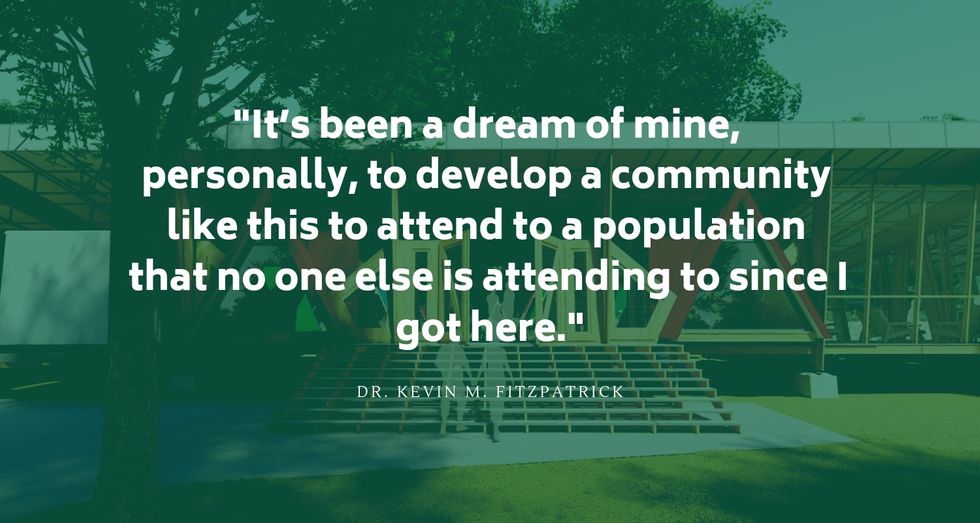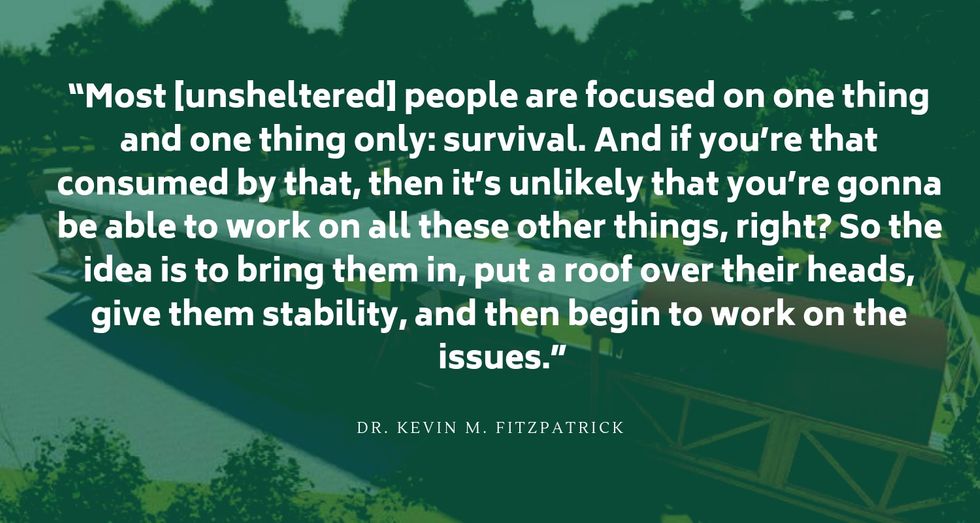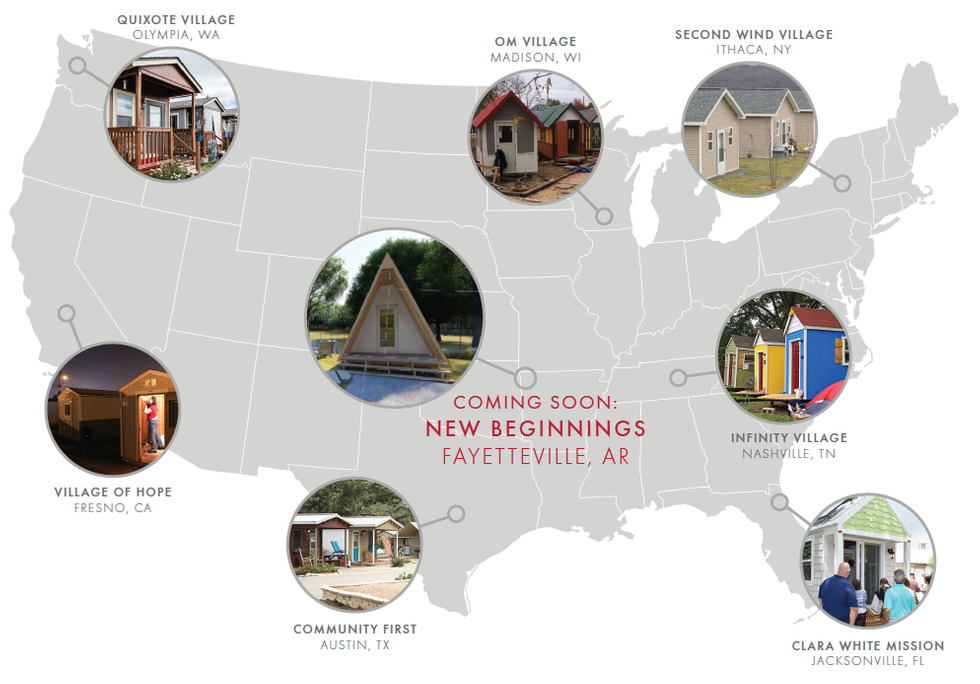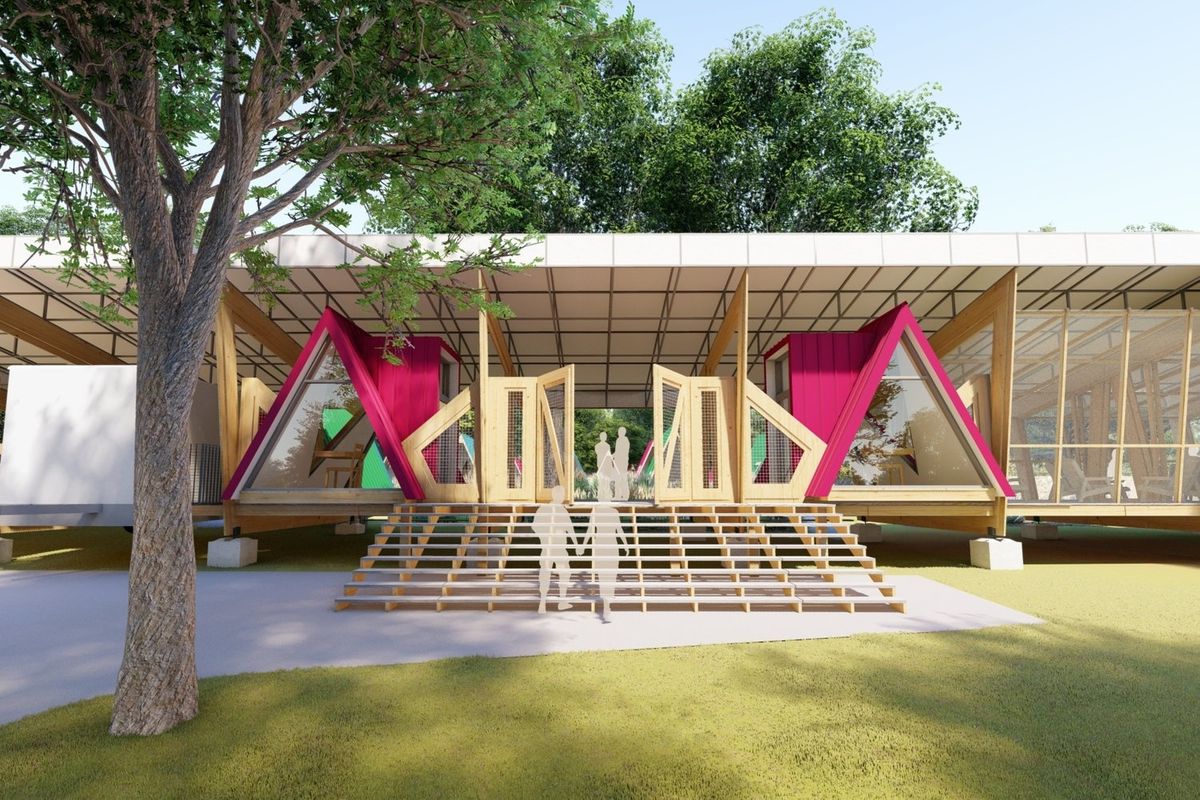The New Beginnings Bridge Housing Community for people in need of shelter is set to break ground on April 12th.
Homelessness is an issue that is often seen as someone else’s problem—it’s easier to think about the people in these circumstances as paying for a mistake that they’ve made, and to tell ourselves: “There is no way that could ever be me.” But sometimes we don’t realize how fragile life really is. Everything can change in an instant and what was once a safe and comfortable life can suddenly turn into a nightmare where you lose everything.
The underlying causes of homelessness are varied and complex, ranging from alcohol and/or drug abuse to untreated mental health issues, to pet-related issues with landlords, to having a criminal record. The flesh-and-blood individuals we call ‘homeless’ are not of a single age, background, ethnicity, or sexual orientation, and often times we just don’t know the story behind how they got to where they are. We see a gap between ‘us’ and ‘them’ because our sheltered lives allow us to erase these individual stories, which makes it easy to look the other way and ignore the issue of homelessness altogether.
But can we ignore the fact that we are fortunate enough to have the lives that we do, and that things could have turned out very differently?
In 2017, 592 visible homeless persons were reported in Northwest Arkansas—these are people accounted for during face-to-face interviews. Currently, experts estimate the number to be higher. That’s why people in Northwest Arkansas have been organizing to develop affordable housing initiatives for the unsheltered population, especially recently with the ground-breaking initiative of the New Beginnings bridge housing community. This housing project consists of a low-cost bridge housing community that takes care of the homeless population in Northwest Arkansas by tackling the underlying causes of their unsheltered circumstance. Through innovative programs like these, Northwest Arkansas will remain committed to working on solving the issue of homelessness in the years to come.
The New Beginnings Housing Project

Dr. Kevin M. Fitzpatrick has been the Vice President of the Board of Directors of Serve Northwest Arkansas for several years. He’s been working in research and advocacy for homelessness for 30 years. Serve Northwest Arkansas is the umbrella nonprofit organization which will run the New Beginnings community program. Dr. Fitzpatrick says that New Beginnings functions as a point of transition from homelessness to permanent housing—”an on-ramp for people who are living in an unsheltered circumstance to come in our community, spend more than 30 days,” which is the length of stay that emergency shelters allow, “and work on the complexity of the issues that are currently keeping them either out of housing or out of a job, or both (in a nutshell, in an unsheltered circumstance), and thus work on that over a period of time so that we essentially create an off-ramp for them to move to more permanent housing.” The idea is to offer a safe and stable place for a person to become able to “confront all of what’s in front of them, to address all of the complexity to get them ready to occupy permanent housing.”
The community itself will consist of 20 individual units of about 175 square feet. These facilities are heated and cooled, and each one has a covered porch with inside storage. The official ground breaking ceremony of New Beginnings will take place on April 12 from 12 p.m. to 1 p.m. at East 19th Street, Fayetteville. This day will mark the starting point of the program, and will be an opportunity for Serve Northwest Arkansas to share their vision for the future of this program with the public.
The ‘Housing First’ Approach
Homelessness is a challenging problem because, despite what many may think, it’s not just a matter of getting a job. In reality, there are many working people in the region who can’t afford housing and have to live at someone’s house or else be forced to live in the woods. New Beginnings offers the space in which people can transition into permanent housing by providing them with the means to stabilize their lives.

To give people the space to work on their underlying issues, the New Beginnings program is following the ‘housing first’ approach, which provides people in need with a stable shelter first and then focuses on helping them with related issues. “We want to create some privacy, security, and stability for people because, operating on the ‘housing first’ principle, we know that in order to successfully work on the problems that many people have [they need a secure environment],” says Dr. Fitzpatrick. The goal is to create “a wrap-around service model that provides case management, housing management, healthcare, dental care—everything that is necessary to bring that person up to speed, up to that level that you and I are at that makes them a well trained potential applicant” to a job.

“Whatever the problems are (there are many of them, they are complicated), we need to be able to create this environment of security,” Dr. Fitzpatrick says. “Most [unsheltered] people are focused on one thing and one thing only: survival. And if you’re that consumed by that, then it’s unlikely that you’re gonna be able to work on all these other things, right? So the idea is to bring them in, put a roof over their heads, give them stability, and then begin to work on the issues.”
Basic Conditions for Entrance
Although the New Beginnings community does not have several of the requirements common in emergency shelters, there are some conditions for entering, which need to be examined case by case. As Dr. Fitzpatrick puts it: “[i[f you have a pet, we’re going to accommodate you. If you are not sober, we’re going to accommodate you. If you have a mental health condition, we’re going to accommodate you. If you have a criminal background, we’re going to accommodate you. We’re really gonna try hard to accommodate you. Then again, if you were convicted of a violent felony, are we going to be OK in taking you? Are you going to make for a good neighbor? You are currently unemployed, not getting any treatment for your bipolar disorder and you’re drinking? That’s a bad combination. [But] [i]f you are sober, you are employed—you had a felony conviction, but it was 15 years ago—are you a better bet? The answer is yes.”
“We’ve got to unpack the situation and make decisions to potentially be more forgiving,” Dr. Fitzpatrick says, “because the current system is not accommodating everybody.”
The Need for Empathy
Dr. Fitzpatrick notes that people are too quick to judge homeless people regardless of their particular circumstance except when it comes to homeless kids. Of course, children shouldn’t be blamed for being homeless, but the harsh attitude that people have towards homeless adults is amplified by the simple fact that they are not kids anymore. Part of the problem with homelessness is not so much the lack of information available to the public as the lack of empathy: “There is no reason for people not to understand the circumstance and the underlying issues around this problem,” says Dr. Fitzpatrick. “We have been educating the general population since the day we walked in Northwest Arkansas in 2005. Last year I did so many interviews: newspapers, magazines—you name it. It’s not like there is a lack of information. I think that what there is is a lack of empathy. We can educate all we want to, but if you educate the people that have no empathy, it’s not going to get us very far.” Dr. Fitzpatrick thinks that part of the work that has to be done to create empathy is to go beyond educating the public and getting people involved in volunteerism and civic engagement. These are ways of getting people to understand “the human condition and not lose sight of the fact that the person that you are interacting with right now has spent the last 18 months living in the woods. Take on the role of that person and imagine yourself in that circumstance. And then coming out of that: how do you think you might be? How is it going to be for you to interact with people generally?”
Some might see the idea of directly giving the homeless a roof over their heads as a handout which gives people a free pass. But if you lose control of your life and for whatever reason end up homeless, the most immediate and basic help of having a safe and stable space can make a real difference in your ability to get back on your feet. The success of programs like the New Beginnings community will be evaluated over the years to come, but there’s one thing that’s already clear: ignoring people in unsheltered circumstance is not going to make the problem go away. Denying homeless people dignity by rendering them invisible is a crisis of empathy. The only way to solve it is to stop turning away, shutting our eyes, and pretending that these members of our society do not exist. It’s time to honestly ask ourselves the question: “Could it have been me?”














